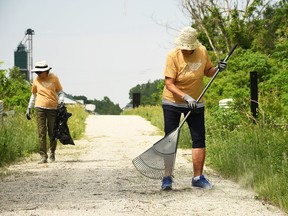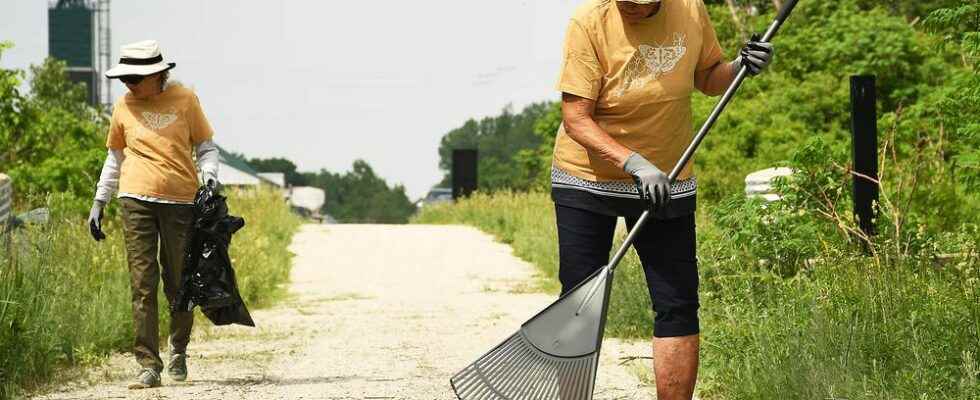A railway turned trail in Ridgetown has been recognized with one of five Trans Canada Trail events across the country.

A railway turned trail in Ridgetown has been recognized with one of five Trans Canada Trail events across the country.
The Municipality of Chatham-Kent used a $2,000 grant to help volunteers with cleaning up the CASO Trail on June 1. While many trails received similar grants from Trans Canada Trail, just a few were recognized by representatives from the trail network and Columbia Sportswear, which also sponsored the event.
Genevieve Champagne, the municipality’s active transportation co-ordinator, said she had the option while applying for the grant for the trail to be considered for the feature designation.
“Five trails across Canada were chosen, and we got lucky and we got picked as one of those featured trails,” she said.
Heidi Tillmanns, national manager of infrastructure and signage for Trans Canada Trail, said the Ridgetown trail received the featured event for Ontario. She said her understanding is Columbia and Trans Canada Trail will also feature the trail by using the footage taken at the event.
The first phase of the CASO trail opened in October 2019. It now runs from Mull Road to Victoria Road, but the next two phases will take it from Communication Road to McPherson Road.
The next phase, from Communication Road to Mull Road, is expected to finish in October.
Champagne said the cleanup grant became available in 2020, but the pandemic prevented the municipality from gathering volunteers together, so this is the first time it has been used.
“The grant provides me funding to be able to purchase materials to have the trail topped up, have staff out here, crusher dust, have the volunteers out and available and provide refreshments,” she said.
The event brought out volunteers and members of the Chatham-Kent Trails Council to assist with the cleanup.
While some may expect litter to be the top priority in cleaning up the trail, Champagne said it’s actually the plant growth that comes onto the trail from its sides.
“It encroaches and closes in the trail and kind of tightens it up,” she said. “When we groom the trail, we turn up the top of it, we pull out the grass and any of that debris and then it fluffs it up and gives it more accessible usage.”
Generally, people have been responsible when using the trails in Chatham-Kent, Champagne said.
“Most of our trail users are those respectful eco-friendly people that do respect those rules,” she said.
“We do have garbage pickers and bags for garbage, but today is more about cleaning up the materials along the trail, trimming it back to make sure that it’s accessible and has enough room for everyone to cycle, walk and get through the trail.”
Tillmanns said the cleanup grants are meant to recognize that “municipal budgets usually go to something other than trails.”
However, she said governments at all levels have started to recognize the significance of trails because of the COVID-19 pandemic. A poll conducted by Trans Canada Trail in November 2020 found trail use was up by almost 50 per cent in all age groups by that point in the pandemic.
“We’ve seen the federal government, even the provincial governments, travel and tourism sectors, really knowing that there is a product here, but some have been let go,” Tillmanns said.
The CASO Trail, and others like it in Southwestern Ontario, are important, Tillmanns said, because the Trans Canada Trail will eventually connect to the US through the Gordie Howe International Bridge between Windsor and Detroit.
